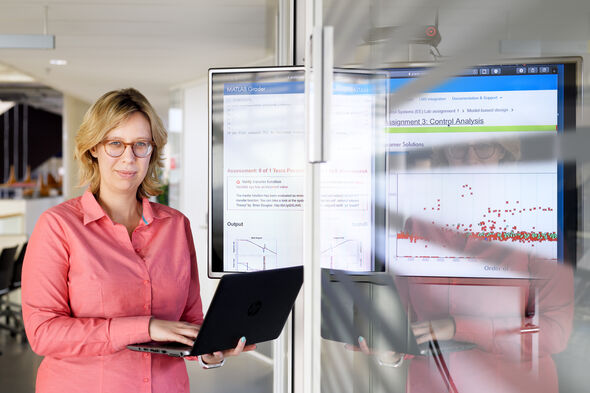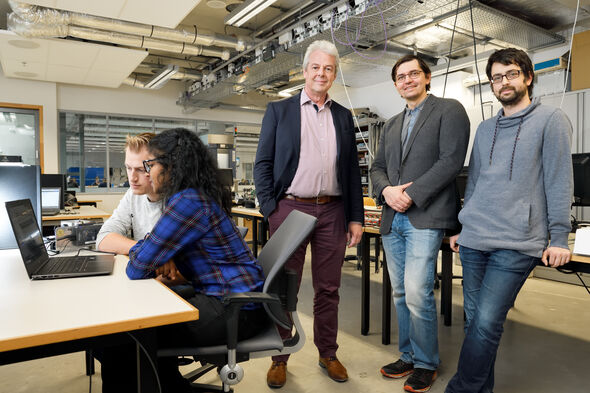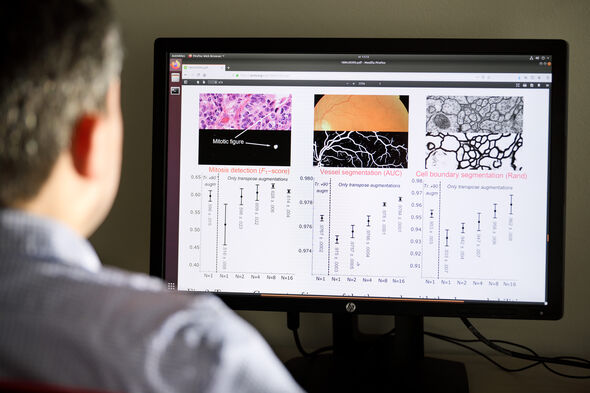
Working on better education yourself
Students would like to have more and more regular feedback during their lectures and lab work, but with the increased student numbers this isn't always possible as often as they and the lecturers would like. Moreover, that last group spends a great deal of time grading tests. With the use of interactive testing, systems that give interim feedback, and tools that prepare data for use, this situation could change. At Biomedical Engineering and Electrical Engineering this technology is going to be put through its paces, with funds from the program plan BOOST. This week and next week Cursor will pay attention to some of these projects.
Working with a group of three hundred students means that some students won't receive an immediate answer to their questions and will only find out late in the day whether they have mastered the subject matter. It also means that lecturers have to grade this many tests. A BOOST project set up for the first-year Systems course and the third-year Control Systems course at Electrical Engineering is intended to change this by introducing interactive tests, videobytes and challenges. An interactive test has already been piloted on the third-year course, and the initial results look promising.
When the opportunity to secure a budget from BOOST presented itself, the lecturers teaching Systems (Mircea Lazar and Maarten Schoukens) and Control Systems (Paul van den Hof and Sofie Haesaert) felt added motivation to turn their wishes into concrete plans. In practice this means that videobytes and pencasts will become an integral part of lectures; that challenges will bring theory and practice closer together; and that students will be able to receive continuous feedback on how they are performing.
Preparations for lab work
A problem had cropped up on the third-year course Control Systems: students and lecturers were starting to find the preparations for lab work, and the lab work itself, a time-consuming business. And this time was not always being spent effectively, observes Assistant Professor Sofie Haesaert. “Students often arrived at the lab unprepared and we had the impression that they weren't always doing a good job of relating the theory to the practice.”
This prompted the decision to reduce the number of lab hours during the first quartile and to introduce a test, which students have to take before they can start their lab work. “This test, which requires students to develop and analyze a mathematical model for a controller, enabled students to verify whether their controller was effective before they entered the lab. They received feedback through Matlab Grader about what was and wasn't correct, and why. The results have yet to be analyzed, but they look promising. There have been a few technical hiccups, which we plan to iron out,” says Haesaert. The lecturers teaching the Systems course are also keen to introduce this ‘advance testing’.
Come what may, the lecturers are keen to introduce more interactive testing on both courses, in an effort to raise the success rate and to reduce their own workload. Evaluations have also shown that students would have liked more feedback.
The idea is to introduce electronic and interactive assignments through Matlab Grader, a tool already in use on these courses - and on various other courses at TU/e. This software is being upgraded and components are being added to make it fit for this new purpose. Students will be able to enter the results of an experiment and answers to questions in the system. They will be able to see immediately what they have done right or wrong and why, and they will see how they are performing compared to other students. “This motivates students not to fall behind. It is very different from having to sit a test halfway through the lecture series. During my lectures I can't answer all my students' questions, and this allows them to get feedback more quickly and more often,” says Assistant Professor Mircea Lazar.
The lecturers are also keen to make more use of videos. “Today's students have grown up with images,” says Lazar. “I occasionally play a video during my lectures when I notice that my students' attention is starting to wander, but ideally these videos would be an integral part of the lecture series.” The lecturers are considering teaching the theory involved in an experiment and following this up with a live video connection to a laboratory showing what that experiment looks like in practice.
Moreover, they are keen to have students do more practice-based challenges.“You can have students solve a software problem with numbers, but you can also have them calculate how they can achieve the fastest lap time with a car,” says Lazar. As a first step, at the end of the fourth quartile of this academic year, he wants to add a challenge to the regular questions in order to test how this will work in practice.
All the changes to the two courses should be implemented, with the aid of student assistants, during the coming two years.
More efficient group work and interim feedback
The BOOST project at Biomedical Engineering will, it is hoped, boost the efficiency of the assessment of group work. It should give students the opportunity to receive interim feedback and to learn from one another. In addition, students should be able to start work more quickly and spend less time preparing datasets in the field of (medical) image analysis and machine learning.
Students taking courses in the field of image analysis or machine learning spend a fair amount of time preparing datasets and setting up experiments. For their part, their lecturers have to spend time inspecting the set-ups - a minor aberration in the code can lead to a major aberration in the results. Time that these lecturers - and students - would prefer to spend on other things. Listening to twenty groups of students give their presentations is also pretty time-consuming, tells Mitko Veta, one of the project's proposers and assistant professor at the Medical Image Analysis research group. Together with Veronika Cheplygina (Assistant Professor Medical Image Analysis) and Joaquin Vanschoren (Assistant Professor Machine Learning), he wrote the project proposal. “What's more, students don't see each other's presentations, they don't have the opportunity to learn from each other nor to cooperate at an earlier stage and swap ideas,” says Veta.
A solution to these ‘problems’, caused in part by the increase in student numbers, could be provided, the project proposers believe, by an online platform. At the press of a button, data and examples could be ready for use, so that students are freed of these concerns to focus on their assignments and the analysis. Furthermore, data should be taken from real-life and should reflect reality, says Veta. The data and images used on these courses relate, among other things, to the detection of cancer and the analysis of blood vessels. The project will also introduce a shared work environment, fostering the exchange of ideas, solutions and models. One of the benefits this will bring is that students will receive interim feedback and will know sooner whether they are on the right track.
Platform
The project's proposers are keen to implement their proposal on eleven courses, and also expect it to be applicable to the bachelor's final project and various master's projects. To facilitate this, they want to use OpenML, a platform developed at TU/e that enables researchers to share and discuss experiments, data and algorithms in the field of machine learning. OpenML lends itself to this, says Veta, but various new functionalities will be needed. The search for a suitably qualified programmer is already underway. If all goes according to plan, the upgraded platform will be ready for use in a year's time.
No fewer than 34 proposers of digital and innovative education projects at TU/e now have the chance to go ahead under the banner of BOOST. Most of these projects are currently in the startup phase. With the abolition of the basic grant and the introduction of the government's loan system, Ministry of Education (OCW) funding is also available, studievoorschotmiddelen as it is called, to support projects financially. In the past Cursor has written about BOOST, what stands for Be the Owner of your Own STudy. Next week we will present another two BOOST projects.




Discussion